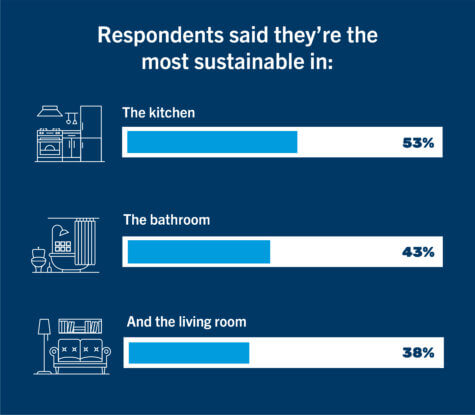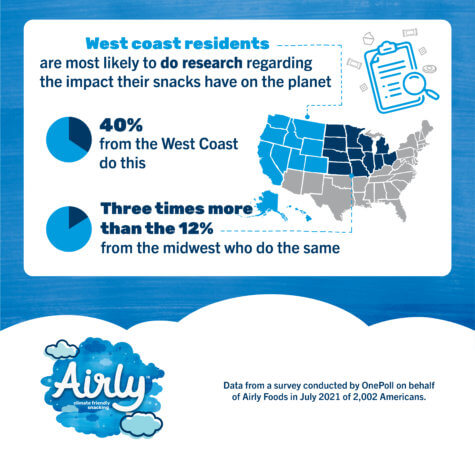NEW YORK — Nine in 10 Americans are making an effort to engage in sustainable practices on a daily basis. A new survey, which asked 2,002 people about their attitudes toward climate change, discovered that three-quarters of respondents agree climate change is an existential threat to future generations.
Researchers find millennials are the most concerned, with 80 percent responding yes, in comparison to 71 percent of Gen Z respondents. Conducted by OnePoll on behalf of Airly Foods, the poll reveals that there is still something of a knowledge gap when it comes to the topic. Despite almost seven in 10 saying they think they know the definition of the term “carbon footprint,” only half could identify the correct definition.
Carbon ‘food’ print?
 Despite a lack of climate knowledge, that didn’t stop many respondents from agreeing that the carbon footprint of the food they eat is a priority; 62 percent say they would love to see food packages come with a carbon footprint label alongside the traditional one listing nutrition.
Despite a lack of climate knowledge, that didn’t stop many respondents from agreeing that the carbon footprint of the food they eat is a priority; 62 percent say they would love to see food packages come with a carbon footprint label alongside the traditional one listing nutrition.
This would likely make an impact on how many people are able to prioritize low carbon footprint when choosing snacks. Currently, only 23 percent say they’re able to do this. West coast residents are most likely to do research regarding the impact their snacks have on the planet, with 40 percent saying they do this. That’s three times more than the 12 percent from the Midwest who do the same.
A quarter of all respondents would consider trying a packaged snack they’ve never had before if it had information claiming to remove greenhouse gases from the air. One in five would try a new snack if it boasted of its carbon-neutral farming practices.
“Consumers want to support companies that are choosing to do the right thing,” says Airly Foods co-founder Jennifer McKnight in a statement. “Just as they read nutrition labels to understand the potential impacts on their personal health, they should also have information about a product’s carbon footprint so they can understand its impact on the planet’s health.”
Being green around the house
 There are plenty more opportunities around the home to practice sustainability besides snacking, of course. Of all the rooms in the house, respondents claim they’re the most sustainable and eco-friendly in the kitchen (53%), while the home office (14%) is where they are the least green.
There are plenty more opportunities around the home to practice sustainability besides snacking, of course. Of all the rooms in the house, respondents claim they’re the most sustainable and eco-friendly in the kitchen (53%), while the home office (14%) is where they are the least green.
It’s the kitchen where people are really putting in effort, using popular interventions that freeze fruit and vegetables before they go bad, buying in bulk to reduce packaging waste, and planning meals ahead of time to cut down on food waste.
While more than half (52%) of respondents think about the impact that the food they eat has on the planet, many feel that their individual efforts are not enough. Fifty-nine percent believe corporations (30%) or governments (29%) should be doing the most to tackle climate change, in comparison to just 26 percent who say it’s up to individuals. More notably, 70 percent of the poll believe it’s food companies that should be coming up with innovations to reduce their impact on the planet.
“Climate change is a colossal challenge, but even the smallest steps when taken by all can add up to make a meaningful difference,” McKnight adds.
